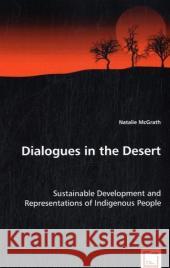Dialogues in the Desert - Sustainable Development and Representations of Indigenous People » książka
Dialogues in the Desert - Sustainable Development and Representations of Indigenous People
ISBN-13: 9783639029864 / Angielski / Miękka / 2008 / 64 str.
Dialogues in the Desert - Sustainable Development and Representations of Indigenous People
ISBN-13: 9783639029864 / Angielski / Miękka / 2008 / 64 str.
(netto: 208,74 VAT: 5%)
Najniższa cena z 30 dni: 218,66
ok. 10-14 dni roboczych
Dostawa w 2026 r.
Darmowa dostawa!
Indigenous people are often denied the right to representation, and this has important implications for sustainable development. This book explores how Australian government practice and discourse frame representations of Martu people, one of the last Indigenous tribes in Australia to come into contact with settler society. The context of the case study is the Western Desert of Western Australia, and spans a number of Martu settlements. The research was action orientated and involved the use of participatory techniques. Two major themes are outlined: power and representation; and the framing of Martu culture. Conclusions emphasise the value of Indigenous relational worldviews, Indigenous autonomy, the negotiation of representative structures and the surfacing of ideologies through deliberative politics. This book emphasises the importance of these for the process of sustainable development.
Indigenous people are often denied the right to representation, and this has important implications for sustainable development. This book explores how Australian government practice and discourse frame representations of Martu people, one of the last Indigenous tribes in Australia to come into contact with settler society. The context of the case study is the Western Desert of Western Australia, and spans a number of Martu settlements. The research was action orientated and involved the use of participatory techniques. Two major themes are outlined: power and representation; and the framing of Martu culture. Conclusions emphasise the value of Indigenous relational worldviews, Indigenous autonomy, the negotiation of representative structures and the surfacing of ideologies through deliberative politics. This book emphasises the importance of these for the process of sustainable development.











